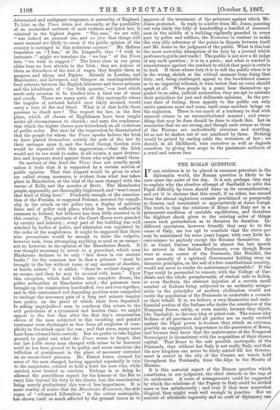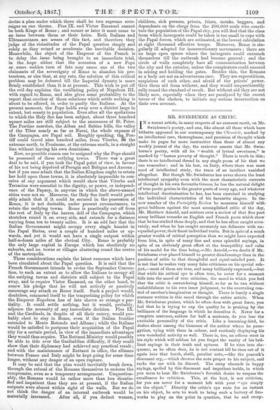THE ROMAN QUESTION.
II' any credence is to be placed in rumours prevalent in the diplomatic world, the Roman question is likely to be once more the order of the day. It is not, perhaps, very easy to explain why the abortive attempt of Garibaldi to solve the Papal difficulty by force should force on its reconsideration; and yet it is obvious that this result, if no other, has ensued from the almost inglorious crusade proclaimed so pompously at Geneva, and terminated so appropriately at Asina Lungs. The truth is, that the relations of Rome and Italy are in a permanent condition of unstable equilibrium, and therefore the slightest shock given to the existing order of things causes such perturbation as to threaten its duration. In- different spectators, however friendly they may be to the cause of Italy, are too apt to conclude that the status quo may be maintained for some years longer, with very little in- convenience to anybody except the Romans themselves. As if, as Count Cavour remarked in almost the last speech he uttered in the Italian Parliament, even though Rome were at some corner of the Peninsula, like Brindisi, the mere anomaly of a spiritual Government holding sway on theoretic principles, on the soil of a free constitutional country, would not serve to render its maintenance impossible! If the Pope could be persuaded to remove, with the College of Car- dinals and the whole paraphernalia of clerical rule to Ischia, or even Sardinia, the abstract injustice of a certain small number of Italians being subjected to an authority antago- nistic to the principles of modern civilization would not excite the population of the Peninsula to undertake a crusade on their behalf. It is, we believe, a very diminutive and unin- fluential section of the Italians who desire the overthrow of the Temporal Power, solely, or even mainly, because they object, like Garibaldi, to the very idea of priest-rule. The reason why Italians of all provinces and all parties are so easily excited against the Papal power is because they attach an extreme, possibly an exaggerated, importance to the possession of Rome, and because they know that the maintenance of the Temporal Sovereignty is inconsistent with the acquisition of their chosen capital. That Rome is the sole possible metropolis of the Peninsula, that without her Italy is not really Italy, and that the new kingdom can never be fairly united till her Govern- ment is rooted in the city of the Cwsars, are tenets held throughout the Peninsula, from the Alps to the Straits of Messina.
It is this material aspect of the Roman question which constitutes, in our judgment, the chief obstacle in the way of its settlement. A score of arrangements could be suggested by which the relations of the Papacy to Italy could be settled more or less satisfactorily ; and even if they were somewhat illogical, they might work well enough in practice. But no amount of scholastic ingenuity and no craft of diplomacy can
devise a plan under which there shall be two supreme sove- reigns on one throne. Pius IX. and Victor Emanuel cannot be both Kings of Rome ; and sooner or later it must come to an issue between them or their heirs. Both Italians and Ultramontanes are aware of this fact, and therefore they judge of the vicissitudes of the Papal question simply and solely as they retard or accelerate the inevitable decision. Meanwhile, the object of the Emperor of the French is to delay the issue being brought to an immediate trial, in the hope either that the accession of a new Pope or some sudden turn of fate may cause one of the two claimants of the sovereignty of Rome to abandon his pre- tensions, or else that, at any rate, the solution of this critical problem may be deferred till the Imperial dynasty is more firmly established than it is at present. This wish to put off the evil day explains the vacillating policy of Napoleon III. with regard to Rome, and also gives some probability to the report that, another of those solutions which settle nothing is about to be offered, in order, to pacify the Italians. At the present moment, the Pope holds sway over a district large in extent, but scanty in population. Even after all the spoliations to which the Holy See has been subject, about three hundred square miles are still subject to the successors of St. Peter. The Pontine marshes, the Alban and Sabine hills, the valley of the Tiber nearly as far as Narni, the whole expanse of the Campagrna, are Papal soil. Roughly speaking, thg..Pon- tiff could travel nine hundred miles, from Viterbo, IR the extreme north, to Frosinone, at the extreme south, in a straight line without leaving his own dominions.
Now, no possible reason can be assigned why the Pope should be possessed of these outlying towns. There was a great deal to be said, if you took the Papal point of view, in favour of his not being deprived of Perugia and Bologna and Ancona ; but if you once admit that the Italian Kingdom ought to retain her hold upon these towns, it is absolutely impossible to co* ceive of any argument which would show that Viterbo and Terracina were essential to the dignity, or power, or independ- ence of the Papacy, in anywise in which the above-named cities were not so. Moreover, the Holy See itself would prob- ably admit that if it could be secured in, the possession of Rome, it is not desirable, under present circumstances, to retain the outlying towns. Rome is practically cut off from the rest of Italy by the barren dell of the Campagna, which stretches round it on every side, and extends for a distance varying from ten to twenty miles. It is an odd fact that the Italian Government might occupy every single hamlet in the Papal States, over a couple of hundred miles or up- wards, and yet it would not have a single outpost within half-a-dozen miles of the clerical City. Rome is probably the only large capital in Europe which has absolutely no suburbs, and no towns or villages clustering round the centre of the metropolis.
These considerations explain the latest rumours which have been circulated about the Papal question. It is said that the French Government intends to revise the September Conven- tion, to such an extent as to allow the Italians to occupy all the outlying towns and districts still subject to the Papal sway, and to require Victor Emanuel, on the other hand, to renew his pledge that he will not actively or passively encourage any attack on Rome itself. Such a project would, doubtless, commend itself to the temporizing policy for which the Emperor Napoleon has of late shown so strange a par- tiality. It could settle nothing, but it would, probably, adjourn the necessity of any immediate decision. Pius IX. and the Cardinals, in despite of all their outcry, would pro- bably, elect to stay in Rome, even if the Italian frontier extended to Monte Rotondo and .Albano ; while the Italians would be satisfied to postpone their acquisition of the Papal city for a certain period, in view of the immediate advantages they would thus acquire. The Rattazzi Ministry would possibly be able to tide over the Garibaldian difficulty, if they could show that their diplomacy had achieved any practical result ; and with the maintenance of Rattazzi in office, the alliance between France and Italy might be kept going for some time longer, without any danger of an open rupture. It may be said that the plan would inevitably break down, through the refusal of the Romans themselves to endorse the compromise, even as a temporary arrangement. Unquestion- ably, the Romans would be rather more than less dissatis- fied and impatient than they are at present, if the Italian outposts were almost within sight of the walls. But we do not think the danger of an internal outbreak would be materially increased. After all, if you deduct women, _ children, sick persons, priests, friars, monks, beggars, and dependents on the clergy from the 200,000 souls who consti- tute the population of the Papal city, you will find that the class from which insurgents could be taken is too small to cope with the Papal forces, which are estimated, at the lowest calculation at eight thousand effective troops. Moreover, Rome is sin- gularly ill adapted for insurrectionary movements ; there are no large open spaces where the insurgents could entrench themselves till the outbreak had become general ; and the circle of walls completely bars all communication between. the city and the exterior, unless the conspirators could succeed. in seizing and holding the gates. Besides this, the Romans as a body are not an adventurous race. They are superstitious, suspicious of each other, and afraid of the priests' power. Give them aid from without, and they would unquestionably rally round the standard of revolt. But without aid they are not likely now, especially when they are paralyzed by the recent terror of the cholera, to initiate any serious insurrection on their own account.































 Previous page
Previous page